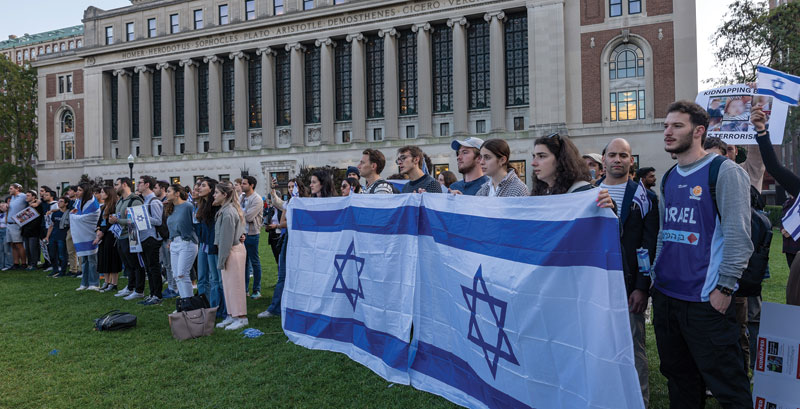Jewish groups were sucker punched last week when the United Church of Christ (UCC) abandoned a carefully crafted compromise and instead voted to support “divestment” from Israel.
Some outraged Jewish leaders publicly suggested anti-Semitism as a motive. Others were uncomfortable with the label, but a growing number of Jewish officials don’t see any other explanation for a divestment push that defies logic and turns fairness on its ear.
Leaders of the divesting churches — including the UCC and the Presbyterian Church (USA) — insist they have nothing against Jews or Israel, but their willingness to be guided by forces that are implacably opposed not just to Israeli policies but to the Jewish state itself, and which seek to use animus against Jews as a tool in that effort, suggest otherwise.
In fact, the accelerating divestment drive is an organized but camouflaged effort to delegitimize, demonize and isolate the state of Israel, not merely change its policies.
The gap between the stated and underlying motives of the divestment push has disoriented the Jewish interfaith activists who are fighting divestment through dialogue with national Protestant denominations and their local affiliates.
Last week’s UCC decision may have clarified matters for many; the results could include a much more confrontational stance on the national level even as community groups around the country continue the painstaking work of building bridges to their Protestant neighbors.
The gap between Protestants in the pews and their national leaders was evident at the UCC general synod in Atlanta when church leaders stepped in at the last minute and discarded a compromise Mideast proposal.
Instead of a reasonably balanced statement urging economic leverage against all promoters of violence in the region, the revised resolution suggested divestment and singled out Israel’s “occupation” as the real cause of the conflict.
The last-minute switch was approved despite months of efforts by Jewish leaders to convince their UCC counterparts that divestment would hurt peace efforts and blast a big hole through Jewish-Christian relations.
Some Jewish leaders now believe the real impetus for divestment is coming from groups like the Sabeel Center in Jerusalem that advocate “liberation theology” on behalf of the Palestinians and seek to impose their radical interpretation of Christianity on churches that were never favorably disposed to Israel, anyway.
Central to that effort is an attack on Christian Zionism — not just the fanatic, prophecy-driven Zionism of Christian fundamentalists, but the core idea that there is a theological justification for a Jewish state, an unbroken covenant between God and the Jewish people. Until that theology changes, some Palestinian Christians charge, the Palestinians will always be oppressed.
The growing alliance between evangelical supporters of Israel and pro-Israel groups has only made the message by these anti-Israel activists resound more strongly with liberal Protestant denominations. Divestment may start with a rejection of the legitimacy of a Jewish state, but it is being fueled by religious wars within these churches.
The fact the divestment drive isn’t what it claims to be — a movement to advance a two-state solution — is evident in both the perspective and the timing of its advocates.
Outright genocide is taking place in Muslim Sudan, whole populations are threatened in other regions, but to the churches, only Israel merits severe economic sanctions. Not even the plight of their co-religionists in places like Egypt and Saudi Arabia seems to upset churchmen obsessed with punishing Israel.
Moreover, the divestment push comes not at a time of Israeli intransigence, but when the Sharon government is pulling out of Gaza.
Even Israeli peace activists who distrust Sharon’s motives for the pullout are hopeful the unilateral move will create a new momentum for peace that will make new withdrawals inevitable — the same thing feared by Israeli right-wingers.
Pushing for divestment at this delicate transitional moment could do more to scuttle peace chances than advance them.
Divestment will be a big boost to the not-one-inch crowd in Israel and their friends among American evangelicals who love Israel so much they want to see it consumed in the flames of their prophesied apocalypse.
Divestment will erect new barriers to any effort by Sharon to build on the Gaza withdrawal with new peace efforts, if that is indeed his intent.
And the continuing divestment push will reinforce those Palestinians engaged in a long-term strategy to advance a “one-state” solution to the conflict — the latest gambit by those determined that a Palestinian state replace Israel, not coexist with it.
Public affirmations by the UCC and other churches that they support Israel’s right to exist ring hollow as their leaders follow a course charted by those who reject that right.
Divestment, as even most Israeli peace activists agree, won’t advance the cause of peace; groups like the UCC which claim that as their goal are either lying or badly deluded by groups that know exactly what they want.
Sadly, what they want can only lead to more conflict and more bloodshed in what these Protestants hypocritically call the Holy Land.






















 More news and opinions than at a Shabbat dinner, right in your inbox.
More news and opinions than at a Shabbat dinner, right in your inbox.